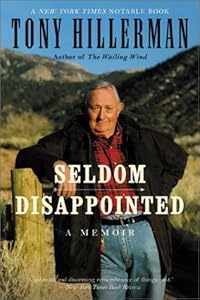The fourth and final installment of Tony Hillerman's memoir Seldom Disappointed deals primarily with his life as a working writer up to about his seventy-fifth birthday, including a sabbatical at a college in Mexico, the publication of his novels, his misadventures in television and movies, the death of his brother, etc.
Hillerman is disarmingly humble and self-deprecating about his success, making it difficult to be too hard on him: it really seems like after he lived through the Depression and World War II, then got married, adopted several children, and had a successful career before becoming a novelist, that he was genuinely grateful and happy, so the rest of his memoir dealt mostly with explaining a sequence of events: writing and rewriting, finding an agent who understood what he was doing, finding an audience, his generally good relationship with various Indian communities, etc.
There really aren't any deep insights or big controversies in the last quarter of his book. I appreciated his explaining why his books have two heroes (Leaphorn and Chee, rather than Leaphorn or Chee), especially, as he admits, they're hard to tell apart: when he sold the option for his first novel, a clause in the contract guaranteed anyone who bought the option a third time the rights to the Leaphorn character, meaning that Hillerman accidentally found himself partway through his career without ownership of his own character. He mentions more than once that he had to buy Leaphorn back at the cost of $20,000.
His other adventures in Hollywood don't go much better: NBC-TV evidently stiffed him for his expenses after saying they wanted to produce a "desert Hawaii Five-O," but gradually deciding what they really wanted had neither Navajos (per se) nor desert, and they also wanted the hero to have a buxom blond sidekick, meaning they really didn't want anything Hillerman could offer.
That is really the last anecdote of interest; Hillerman more or less looks around at the end and realizes he doesn't have an ending, so he says "well, guess I'll get back to writing" and does. The book ends with a discussion of problems he had to solve in his published novels, a comprehensive bibliography of books he'd written, collected and uncollected stories, books to which he'd contributed, and finally books about him and his work, including several books by crime writer Ken Englade.
This is still a really good memoir: fast-paced, no-nonsense, and very readable. A person could pick worse as a model.
exercises in compound storytelling
Subscribe to:
Post Comments (Atom)

![Reblog this post [with Zemanta]](http://img.zemanta.com/reblog_c.png?x-id=832acda5-82eb-4e24-a27a-402f2323a2c2)

No comments:
Post a Comment